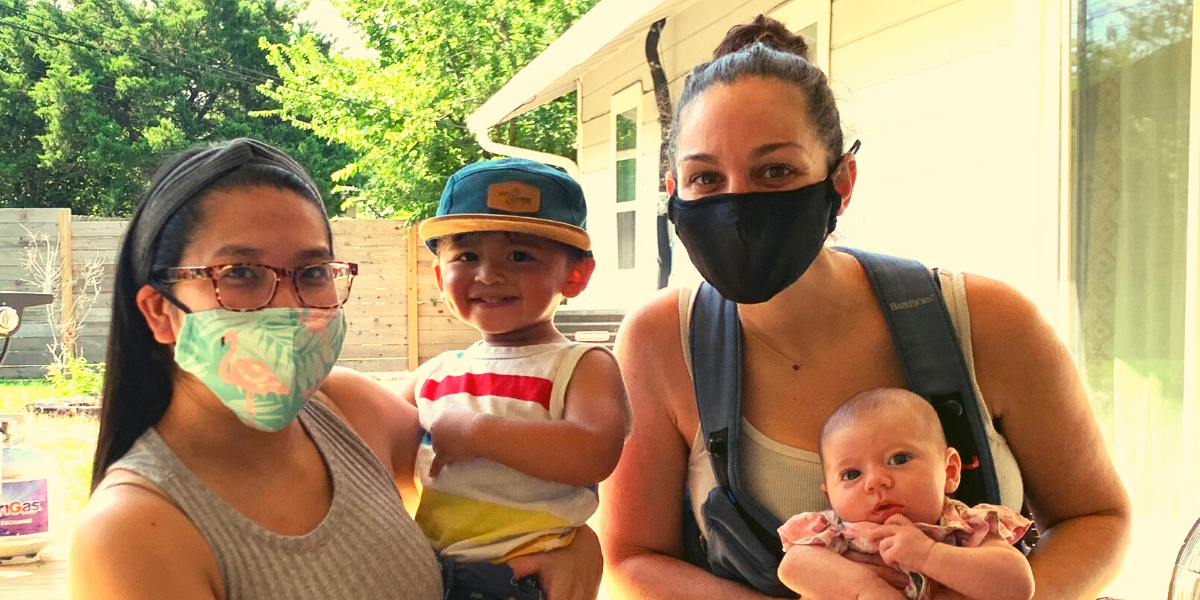A story of how two women were brought together over recurrent pregnancy loss
Kim and Julia weren’t best friends in college, they didn’t meet at a book club, or even through mutual friends at a dinner party.
Kim and Julia became best friends after their doctor, a reproductive endocrinologist and infertility specialist, connected them in hopes that they would find mutual support and comfort in one another in a time of need.
At the age of 28, Kim and her husband had been trying to have a baby for nearly one year during which they suffered five miscarriages. At the age of 31, Julia and her husband had also been trying for a baby, and they also suffered five miscarriages in less than one year.
1 in 4 couples will experience one miscarriage, and 1 in 8 couples will experience two or more miscarriages, which is referred to as recurrent pregnancy loss.
Only 50% of these couples are able to find out the cause of their pregnancy loss.
For Kim and Julia, the cause of their multiple miscarriages remains unknown. Tens of thousands of families across the United States are devastated each year by pregnancy loss, often suffering in silence.
By sharing stories and speaking out to lift the stigma surrounding pregnancy loss, we can better support these women and families.
After her first four miscarriages, Kim self-referred to Winifred Mak, MD, PhD, reproductive endocrinologist and infertility specialist in the UT Health Austin Women’s Health Institute. “After your first miscarriage, there’s this weird sense of needing to re-try, a sense of needing to be successful. But after my fourth miscarriage, I started thinking, ‘Okay, something isn’t right.’ A friend of mine had seen Dr. Mak, so I set up an appointment. Immediately, I felt like I could talk to her and that she understood what I was going through,” says Kim.
Under Dr. Mak’s care, they found no definitive cause of Kim’s multiple miscarriages, which can be difficult for many women and couples to understand and accept. After two months, and two more spontaneous, but equally devastating, miscarriages, Kim became pregnant again, but continued to suppress her excitement. “A positive pregnancy test was terrifying for me and my husband. We weren’t celebrating like most couples. We were just so afraid of losing another baby and knew that there wasn’t anything we could do,” recalls Kim.
 Alternatively, Julia had suspected that she may have infertility issues knowing that others in her family had also experienced infertility. “I expected to have a hard time actually getting pregnant, but after one month of trying, incidentally, it happened. Then a week and a half later, I got my period. My ob-gyn reassured me that this happens often. I got pregnant, again, fairly quickly, but at nine or ten weeks, I lost the baby. I started seeing a fertility specialist, but during that time, I went on to have two more miscarriages that were further and further along. It was devastating,” says Julia.
Alternatively, Julia had suspected that she may have infertility issues knowing that others in her family had also experienced infertility. “I expected to have a hard time actually getting pregnant, but after one month of trying, incidentally, it happened. Then a week and a half later, I got my period. My ob-gyn reassured me that this happens often. I got pregnant, again, fairly quickly, but at nine or ten weeks, I lost the baby. I started seeing a fertility specialist, but during that time, I went on to have two more miscarriages that were further and further along. It was devastating,” says Julia.
It wasn’t long until Julia decided, after doing some research of her own, to seek out a second opinion from Dr. Mak.
“Sitting down with Dr. Mak was just night and day different from my other fertility specialist,” explains Julia. “She was very realistic and helped me get to a place where I felt so much more at ease. I remember one night she called me after work to discuss this procedure we had been considering and listened to all of my concerns. She spoke to me professionally, almost like a colleague, and not the crazy anxious patient I was, and I really appreciated that.”
Oftentimes after getting married or having been married for some time, women are innocently asked by friends, family, colleagues, and even strangers when they plan on having kids or why they don’t already have kids. Julia recalls the pain that came along with those types of questions while she was experiencing miscarriages.
“I know nobody ever means to be rude or malicious, but I would always think to myself, ‘Yeah, I am supposed to have a baby right now.’ There were times where I had to skip baby showers or one-year-old birthday parties, because I just couldn’t mentally do it,” shares Julia.
After seeing Dr. Mak for several months, both Kim and Julia successfully became pregnant and carried their babies to term, graduating from Dr. Mak’s care.
Throughout their pregnancies, the joy of having a successful pregnancy was overshadowed by the constant worry of something going wrong. “I didn’t think about announcements, gender reveals, or baby showers,” says Julia, “I didn’t name the baby or even put together a nursery. Having those miscarriages really robbed me of enjoying my pregnancy.”
“So many people are posting and sharing all the excitement they have about being pregnant on social media, and it was just really hard to see sometimes,” shares Kim. “There was never a point in my pregnancy where I wasn’t scared to death.
Thankfully, Dr. Mak and her team were always available to listen to my concerns and allowed me to feel heard, recognized and empathized with, which was invaluable to me being able to maintain any level of positivity during the process.”
 Kim and Julia, who are so deeply connected over their difficult journeys towards motherhood, now swap parenting stories about their rainbow babies.
Kim and Julia, who are so deeply connected over their difficult journeys towards motherhood, now swap parenting stories about their rainbow babies.
Kim is expecting her second child in just a few months, this pregnancy also being under Dr. Mak’s care.
“I want other women and couples out there who may be suffering from pregnancy loss to know that they are not alone, it’s not their fault, and to never lose hope,” says Kim.
For more information about the Reproductive Endocrinology Clinic in the Women’s Health Institute at UT Health Austin, call 1-833-UT-CARES (1-833-882-2737) or visit here.













